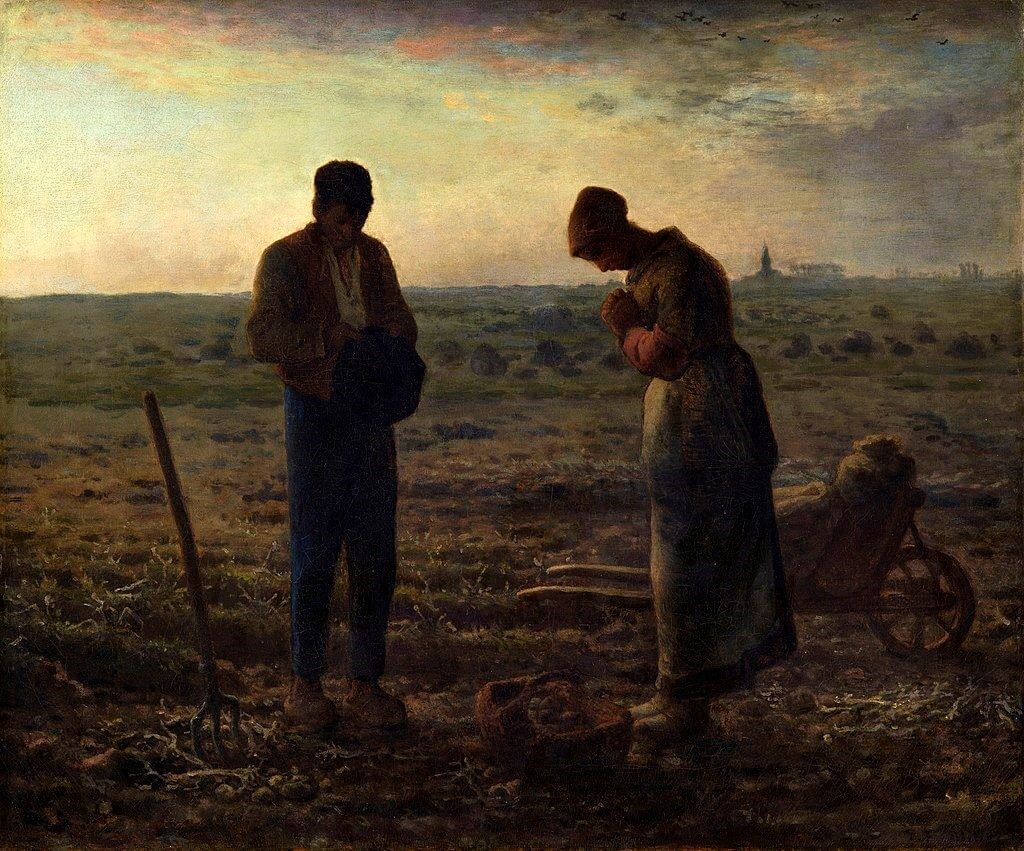Photo: “The Angelus,” by Jean-Francois Millet
As I was reading “We Are All God’s Children,” my friend and colleague Randy Lioz’s most recent column, I was touched by his heartfelt sentiment and genuine desire to find the humanity and value in those with whom we most strongly disagree, and whom we might be tempted to dehumanize. The Lord’s admonishment of His angels, after the deaths of Pharaoh’s army in the parting of the Red Sea, is the most profound example Randy cites from scripture.
It also reminded me of the importance of religion in our culture. Although I understand why some see religion as worsening our divisions—in that it can be a source of hatred and intolerance—I take the opposite point of view. Religion is, in fact, part of the solution to our divisions, and attempting to maintain a healthy culture without religion is fraught with difficulty, and perhaps doomed to fail.
My own personal religious history is mixed. Raised Catholic, I left the Church during my high school years, when neither my Catholic parish nor my Catholic school were able to give coherent answers to my adolescent questioning. As an adult, I remain a sort of agnostic Catholic, unsure whether Christianity’s assertions about the life and resurrection of Jesus are true, yet nonetheless riveted and inspired by the Church’s teachings and its central role in our culture’s history.
For many, neither the teachings nor the history of the Judeo-Christian tradition[i] are arguments in its favor. This is understandable. From a secular perspective, the tradition has done far more harm than good, from the adventurism of the Crusades and other religious wars, to anti-modern inflexibility on social teachings, especially regarding sexual matters, and other persecutions of ‘heretics.’ As my progressive friend Randy has emphasized to me, he still thinks religion has done just as much harm as good in the world.
But as I used to tell my students when I was a high school Latin teacher, it’s hard to comprehend how abhorrent the world was before the victory of Judeo-Christian values in the 400s AD. Gladiators used to fight to the death for the entertainment of the masses. Genocide was normalized if not celebrated. Prostitution and sex slavery was widespread. Slavery was deemed natural. Romans and Greeks practiced infanticide of newborns if the baby was unwanted.
As any perceptive reader will note, the cultural victory of Judeo-Christian values didn’t end all of these heinous practices, some of which persisted well into the modern era, even to this very day. But over time, our culture was transformed by a continuous striving towards, and a gradual living up to, the ideals of the Judeo-Christian tradition. The crown jewel of that tradition is the belief in the inherent value of human life, a belief so successful that it is held now by nearly everyone, believer and non-believer alike, in most societies.
It’s hard to argue that we would have gotten to the conviction that “all men are created equal” if the foundation had not been laid by the Judeo-Christian tradition. Although Christianity was too slow to condemn slavery outright, the moral foundation of the rejection of slavery rejection was essentially Christian, and most 18th-century and 19th-century abolitionists were moved to their political positions by Christian beliefs. Much of human culture before Judaism and Christianity was diametrically opposed to the values we hold most dear today. Perhaps religion has served its purpose and we can discard it as unnecessary scaffolding—but I’m not so sure.
One of the most perceptive observers of American democracy was the Frenchman Alexis de Tocqueville, who visited the U.S. in the 1830s. His classic book Democracy in America is a landmark work, perhaps never equaled, for its insight into the United States and its culture. For Tocqueville, a religious spirit was absolutely essential for the health of a democratic republic:
“Despotism may govern without faith but liberty cannot. Religion is much more necessary in a republic…than a monarchy; it is more needed in democratic republics than in any others. How is it possible that society should escape destruction if the moral tie is not strengthened in proportion as the political tie is relaxed? And what can be done with a people who are their own masters if they are not submissive to the Deity?” -Democracy in America, Chapter XVII
If Tocqueville is right, we’re in trouble. The percentage of Americans who claim “no religious affiliation” (23%) continues to grow, now numbering about the same as Catholics (21%) and Evangelicals (25%). Unlike in Europe, people of faith are still a significant majority in our country—but too often such faith is more cultural than personal. If Tocqueville is right, perhaps much of the disintegration we’re experiencing as a culture is connected to our loss of shared spiritual foundation, particularly when for many people, religion is more a proxy for political views than a source of virtues such as mercy, compassion, and humility.
The word religion is connected to the Latin word “religare,” which can mean to “bind”. Religion gives a society a strong common foundation, a cultural glue. For some time we have allowed this cultural glue to become significantly weakened, without replacing it with any substitute or alternative. Every society needs some sort of organizing, coherent worldview or philosophy. Without such a coherent, shared worldview, we’re left with a vacuum that will be filled with less healthy, more unsavory values. I can’t help but think that many nonbelievers and agnostics have some lingering intuition about this, and to me it explains the reaction of horror and loss many expressed when Notre Dame, the great French cathedral, burned recently. Deep down, there’s a sense of the importance of the sacred to our society.
When we lose core religious convictions, not much is left besides the loves of money, pleasure, and power. Our identities become much more fragile. We are more likely to lack a healthy centering force in our lives, and become somewhat unmoored. It is no surprise to me, that an age in which religion is declining and being co-opted by politics, is an age in which political polarization is on the rise. Nor is it any surprise to me that many reds come to our organization, Braver Angels, out of a sense of spiritual duty.
I’m concerned for our democracy when our vices of materialism, greed, indifference, cruelty, and hatred are increasingly no longer counter-balanced by the strong virtues taught by religious practice. Indeed, they are increasingly not seen as vices at all. I have no doubt that the moral evils which plagued the pre-Christian world could return in a post-Christian world. Without a belief in human dignity inspired by religious practice, the conviction that “all men are created equal” might come to seem quaintly naive.
So I’m intrigued and encouraged that, even to a secular Jew and “agnostic atheist” like my friend Randy, the Seder meal and the lessons of Exodus still have some relevance. I’m intrigued and encouraged that, to an agnostic Catholic like myself, religion still deserves pride of place at the heart of our culture.
For those who see only evil and folly in our religious traditions, I would humbly suggest considering what our world would really look like, without the cultural cohesion of religion and the unique values that stem from it. I would ask, as well—what sort of worldview or philosophy could, practically, take its place?
For those who see religion only as a blessing, I would humbly suggest considering the harm and hurt it has caused both in history and in people’s lives. I would ask—what we can do to keep religion healthy, and a source for good, and not for evil? Only by recognizing both sides of religion and its legacy can we hope to make progress toward common ground. For me, a world without religion is scary, even though personal belief has sometimes been hard in my own life. For me, religion and democracy need each other, each enhances the other, and our lives are richer because of both.
[i] I include Islam in the Judeo-Christian tradition. And though Eastern religions such as Buddhism and Hinduism are not part of that tradition, in my view they provide the same social and personal benefits to society that the Judeo-Christian traditional does. It’s the presence of religion that counts, not the presence of a particular religion. Although not all religions are the same, they do all offer a valid foundation for cultural cohesion.





4 thoughts on “The Value of Religion to Our Culture”
In November I attended the Parliament of the World’s Religions in Toronto. Over 200 religious groups were represented at this gathering to learn, increase our understanding of one another, and seek ways to work together for solutions to major global issues. I was reassured by the author’s note at the end of the article that religions outside the Judeo-Christian tradition offer many benefits to society. As the author points out that fewer people identify with a particular religion, and more people consider themselves outside of religion, it could be helpful to note that one of the categories a participant could choose at the Parliament was “spiritual but not religious”. If these people were counted in the statistics, I think it would greatly increase our sense of hope for the moral fiber of our country and the world.
Nirvair, thanks for your thoughtful and positive comment. I have deep respect for Eastern religions, and my own tradition of Catholicism has a rich history of engagement with Buddhism and Hinduism in particular. I am, however, a little skeptical of “spiritual but not religious”. I understand why it’s good for individuals , but I wonder about society. I fear that we have enough individualism already. What I’m hoping for are institutions that help bind us together.
I very much share your concern about the role of religious institutions in the social fabric. That said, I have more experience than I’d wish on anyone in being a misfit for most institutions, especially religious ones. That’s because institutions tend to operate according to their own inner logic, which makes them insensitive to individual seekers’ needs.
I think there is a space of opportunity between religious institutions and individualistic spirituality. It’s populated by small, autonomous spiritual communities in the broadest sense, e.g. 12-step groups, book groups, prayer groups, or “life sharing groups” (that’s what a late pastor in my town called the groups he put together for seekers who wouldn’t join churches). There’s a lot of good “weaving of the fabric” being done in these less-than-visible spaces.
It is my theory that the two largest religious denominations in America today are Democrats and Republicans. I can only speak for my own faith – Catholicism. But, I can honestly say that neither party comes close to capturing the essence of Catholicism in the public life. Religion does more than add value to our American culture; it is the basis and foundation of our constitutional democracy – that we are all endowed by our Creator with inalienable rights, including the rights of life, liberty, and the pursuit of happiness.